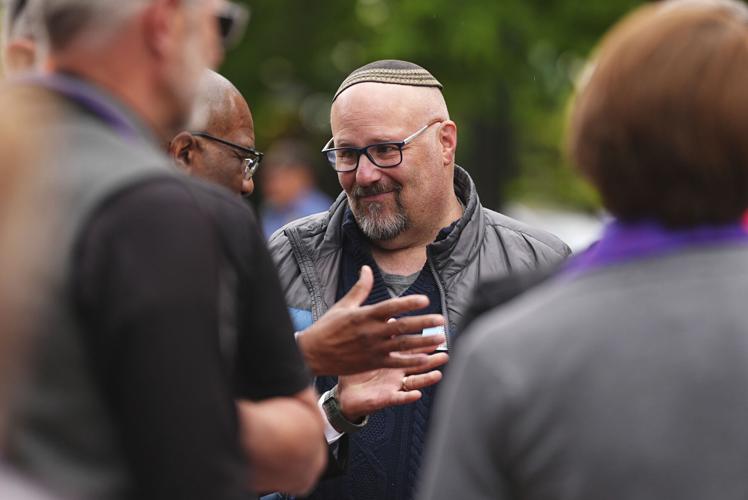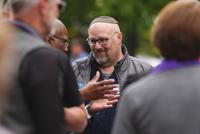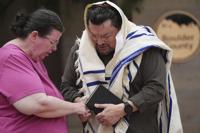For the leaders of U.S. Jewish institutions, the recent attacks in Boulder, Colorado, and Washington, D.C., are stark reminders of their responsibility to remain vigilant despite years of hardening their security measures and trying to keep their people safe.
Now, they’re sounding the alarm for more help after a dozen people were injured in Boulder while demonstrating for the release of Israeli hostages in Gaza on Sunday. And just over a week earlier, two Israeli Embassy staffers were fatally shot outside a Jewish museum in Washington.
After that shooting, 43 Jewish organizations issued a joint statement requesting more support from the U.S. government for enhanced security measures. Specifically, they asked Congress to increase funding to the Nonprofit Security Grant Program to $1 billion.
“Every Jewish organization has been serious about security for years. We have to be,” said Rabbi Rick Jacobs, president of the Union for Reform Judaism. “The grants are to harden the buildings, for things like cameras and glass, and some kind of blockage so they can’t drive a truck into the building."
“These are the everyday realities of Jewish life in the 21st century in America. It’s a sad reality, but it is an essential responsibility of leadership to make sure that people are first and foremost safe.”
Shira Hutt, executive vice president at The Jewish Federations of North America, said existing federal funds were inadequate, with only 43% of last year’s applicants to the grant program receiving funding.
Citing the attack in Boulder, she said increased funding for local law enforcement is also crucial.
“Thankfully, the attack was stopped before even further damage could have been done,” she said. “This is really now a full-blown crisis, and we need to make sure that we have all the support necessary."
One of the Jewish Federation's state-based affiliates, JEWISHcolorado, on Tuesday launched an emergency fund to raise $160,000 in support of the Boulder community. Its goals include enhancing safety and security measures for Jewish institutions and events.
Strengthening alliances and pushing for results
Leaders of Jewish Federation Los Angeles urged government, business and philanthropic groups to “supercharge an alliance so we can build mutual understanding, dispel conspiracy theories, and provide rapid response when any group is under threat.”
“Jews here in Los Angeles are terrified but determined,” said the federation’s president, Rabbi Noah Farkas. “We do not need more community meetings, we need results and we are counting on our local government and our law enforcement partners to do more.”
The security costs at 63 Jewish day schools have risen on average 84% since the Israel-Hamas war began on Oct, 7, 2023, according to the Teach Coalition, the education advocacy arm of the Orthodox Union, an umbrella group for Orthodox Judaism.
The coalition is advocating for more state and federal security funding for Jewish schools and camps, as well as synagogues.
The attacks in Washington and Boulder only heighten the urgency, said its national director Sydney Altfield.
“Some people see this as an isolated instance, whether it is in Colorado, whether it’s in D.C.,” she said. “But we have to step up and realize that it could happen anywhere. … It is so important that our most vulnerable, our children, are secure to the highest extent.”
In Florida, Rabbi Jason Rosenberg of Congregation Beth Am said members of the Reform synagogue in the Tampa Bay area “are feeling very nervous right now and having some additional security might make people a little bit more comfortable.”
He said that “there’s a definite sense that these attacks are not isolated events, that these attacks are, in part, the result of a lot of the antisemitic rhetoric that we’ve been hearing in society for years now.”
However, he said part of his message as a faith leader in such a climate has been to encourage resilience.
“We can’t let this define us. … We can’t stop doing what we do; we can’t stop coming to synagogue; we can’t stop having our activities,” he said. “Our job is to add holiness to our lives and to the world, and we can’t let this stop us from focusing on sacred work.”
Security concerns inside and outside
Jacobs, the Reform Judaism leader, said the latest attacks in Washington and Boulder signaled that new security strategies were needed.
“Yaron Lischinsky and Sarah Milgrim were murdered outside of the event at the D.C. Jewish Museum,” he said.
“And that presented a whole additional sort of challenges for law enforcement and for each of our institutions doing security, which is: you can’t just worry about who comes in; you actually have to worry about who’s lurking outside, and so, that is part now of our protocols."
The attack in Boulder, he said, took place during a “peaceful protest” where demonstrators were calling for the release of Israeli hostages in Gaza.
“We have to worry about what happens inside our institutions. … We also have to be thinking and working with law enforcement about what happens outside.”
Jacobs recalled that when a Christian leader recently visited a Reform synagogue, he was “stunned by the security protocols,” which included procedures that Jacobs likened to passengers passing through airport security.
“I said, 'Well, what do you do in your churches?’ and he said, ‘Well, we like to be welcoming.’ And I said: ‘We don’t have that luxury. We want to make sure our people feel safe, otherwise people will stop coming.’"
Associated Press reporter Tiffany Stanley contributed to this report.
Associated Press religion coverage receives support through the AP’s collaboration with The Conversation US, with funding from Lilly Endowment Inc. The AP is solely responsible for this content.




